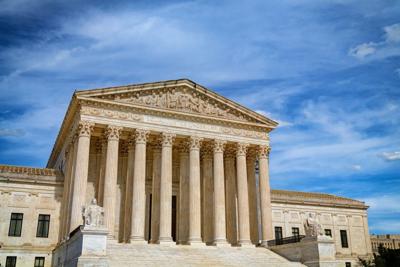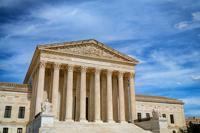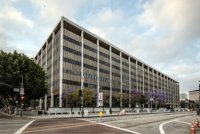The Supreme Court closed its term with a 6 – 3 decision expected to have a profound effect on immigrants and their families. The case, Trump v. CASA, challenged the nationwide injunctions on the Trump administration’s day-one executive order to end automatic or birthright citizenship for children born in the United States to parents who are undocumented or have temporary legal status.
The court did not rule on the constitutionality of Trump’s order to end birthright citizenship. They ruled on whether or not lower courts had the right to stop the order from going into effect through a court order called an injunction. A majority of the justices said that lower courts, each of which covers only part of the United States, could not issue injunctions that affected the entire country. That power, they decided, was only for the Supreme Court. Lower court injunctions would only apply to the plaintiffs in the case.
The decision doesn’t change birthright citizenship immediately and won’t change anything in California in the short term. The Supreme Court ordered a 30-day hold on enforcing the executive order and California is a plaintiff in a case that challenged the Trump administration’s executive order on birthright citizenship.
On the first day of the Trump administration, Jan. 20, 2025, Donald Trump signed an executive order to end birthright citizenship, a constitutional right enumerated in the citizenship clause of the Fourteenth Amendment. On Jan. 21, several immigrant rights groups and 22 states, including California, came together to sue the Trump administration for violating the Fourteenth Amendment. Judges in multiple jurisdictions issued nationwide injunctions, halting implementation immediately.
The Supreme Court’s June 27th ruling allows the Trump administration to enforce the order in the states that did not sue the administration. That means this decision cleared the way for the executive order to go into effect in the 28 states that did not challenge it, but the injunction will stay in place in the 22 states that did challenge it, like California.
The decision did illuminate a pathway for broader challenges through class action lawsuits, which are designed to protect entire classes of people as opposed to individuals or individual states. Several immigrant rights’ advocates filed a nationwide class-action lawsuit challenging the Trump administration’s executive order restricting birthright citizenship on June 27.
“We’re going to see a flurry of legal actions, and we’ve already seen some legal actions filed to head off the executive order,” explained Kevin R. Johnson, a Professor of Law at UC Davis. “If the executive order were to go into effect, California would be one of the states most heavily affected because it has the largest undocumented population,” he added.
This decision did not rule on the constitutionality of the executive order, but the Supreme Court will address that question as early as next year.
“There was a lot of discussion about nationwide injunctions and the power of a lower federal court to issue nationwide injunctions, but there was no, absolutely no justice who suggested that birthright citizenship could be ended by executive order, and I view that as a positive sign in the opinions,” Johnson said.
While nationwide injunctive relief is still possible through class action cases, it is now more complex, burdensome, and difficult to secure on an emergency basis, said Winifred Kao, a senior counsel with Asian Law Caucus (ALC), one of the organizations involved in the lawsuit.
“These nationwide injunctions that the lower courts have been issuing have been a critical tool for impacted communities to be able to efficiently secure emergency protection on a nationwide basis against these unprecedented attacks on constitutional rights,” said Kao.
Kao said that if birthright citizenship were to end, it would create a generation of stateless children, not only without a sense of belonging, but also barred from receiving many public services.
“They could be denied basic rights including health care, nutrition assistance, social security numbers and passports. As they grow up, they could be barred from voting, jury service and holding certain jobs,” said Kao. “The harms really are kind of hard to overstate.”
This decision also jeopordizes about 25 other nationwide injunctions that blocked presidential actions from the Trump administration since January alone, Kao said. They include injunctions realted to immigration: one that restored funding for the legal defense of undocumented minors, one that prevented the abrupt end to humanitarian parole and one that paused deportations to countries other than the immigrant’s home country. Only the plaintiffs named in those cases will be protected by the injunctions unless further legal action is taken.
The Supreme Court’s decision leaves more questions than answers when it comes to what’s next for the end of birthright citizenship, especially how it will be enforced. Kao predicted an enforcement nightmare when it comes to determining citizenship at birth.
“Currently all children born in the US are issued birth certificates without any kind of check of their parents’ immigration status. Implementation of this executive order could be pulling doctors and nurses or hospitals into this immigration enforcement nightmare,” said Kao. “Birth parents would have to justify or prove their immigration status in order to be sure that their babies got citizenship.”
What’s next for birthright citizenship in the states that did not sue over the executive order when the 30-day hold ends on July 27 remains uncertain, but Kao said she’s hopeful. “We have filed this nationwide class action [lawsuit],” Kao said. “We feel very optimistic that we’re going to be able to get another injunction for the nationwide class of all affected babies and parents in the United States before the 30 days are up.”
For those who are undocumented, Johnson advised attending Know Your Rights sessions to understand the risks and develop family plans. “ Any undocumented immigrant for an incredible variety of reasons should make sure to attend Know Your Rights sessions,” he added, “to get an idea of what non-profits are telling people about the risks, and what should be done in the event of all kinds of things, including the elimination of birthright citizenship.”










(0) comments
Welcome to the discussion.
Log In
Keep it Clean. Please avoid obscene, vulgar, lewd, racist or sexually-oriented language.
PLEASE TURN OFF YOUR CAPS LOCK.
Don't Threaten. Threats of harming another person will not be tolerated.
Be Truthful. Don't knowingly lie about anyone or anything.
Be Nice. No racism, sexism or any sort of -ism that is degrading to another person.
Be Proactive. Use the 'Report' link on each comment to let us know of abusive posts.
Share with Us. We'd love to hear eyewitness accounts, the history behind an article.